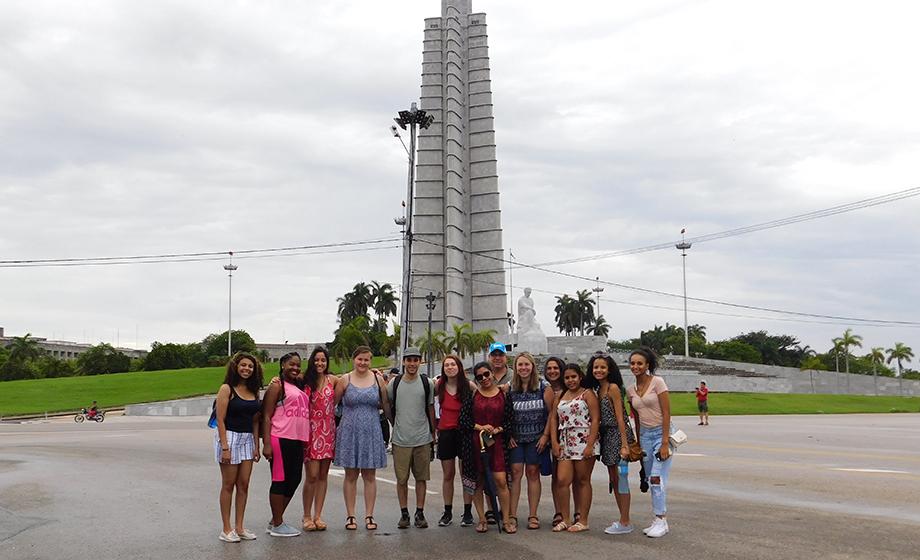
Cuba has often been referred to as an island nation that is “stuck in time.” However, Crystal Hill ’20, a women’s and gender studies major, was pleasantly surprised to notice that while the city of Havana included classic ’50s Cadillacs and relics from years past, it also contained billboards about modern-day social problems such as the dangers of domestic violence.
Hill was one of 11 students enrolled in a Youth Culture in Cuba: A Service and Learning Opportunity course; the students spent nine days in Cuba earlier this summer. The students and their instructors Micki Davis, director of community engagement, and Laurie Ross, associate professor of Community Development and Planning, stayed with homestay families while they visited government-sponsored and other youth-serving organizations to learn how the organizations provide opportunities for youth in Cuba to express themselves creatively, socially, and politically. The group attended lectures and participated in a service learning activity with Cuba Skate where they helped make skateboards with and for Cuban youth.
Hill kept a blog about her trip and reported that the group learned about great resources and heard from excellent speakers while in Cuba. One person who resonated with her was Mareelén Díaz Tenorio from El Centro Oscar Arnulfo Romero (OAR). Díaz Tenorio spoke about the services and programs their organization offers that focus on women’s reproductive health and physical and mental well-being.
Hill found Cuba’s approach to sex education more progressive than anything she’s seen in the United States, where she said religious groups tend to push abstinence.
“Cuba’s current lack of traditional major religion has led to educational campaigns that don’t focus on approaches common in the United States like abstinence. I was so delightfully intrigued by this conversation because to me, this served as one of the many things that dismantled the idea that Cuba is a country that is completely stuck in the past. The success as well as the positive attitude by the youth towards these campaigns made me reevaluate what it means to live in a ‘modern country,’” she wrote.
Davis said the trip was “an exciting opportunity to learn first-hand about the experiences, opportunities, and struggles of Cuban youth.” She also said that the experience provided insight into “the complicated nature of the political relationship between the U.S. and Cuba.”
Four students who traveled with the group — Ariana Mohammad ’18, Lorena Chelaru ’18, Zion Bereket ’18 and Naomi Weintraub ’19 — received funding from Clark’s Liberal Education and Effective Practice (LEEP) initiative to complete projects about Cuban youth culture to share with the Clark and Worcester communities. A grant from the Office of Diversity and Inclusion helped offset the cost for four others to make the trip.


